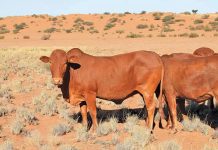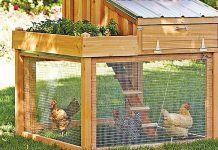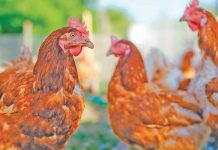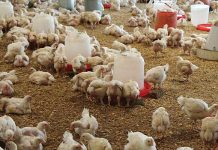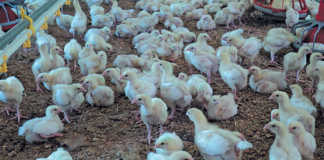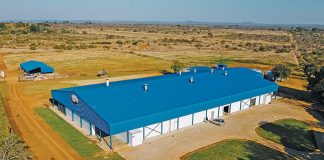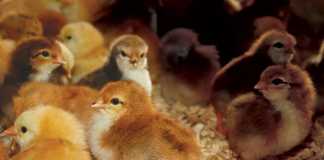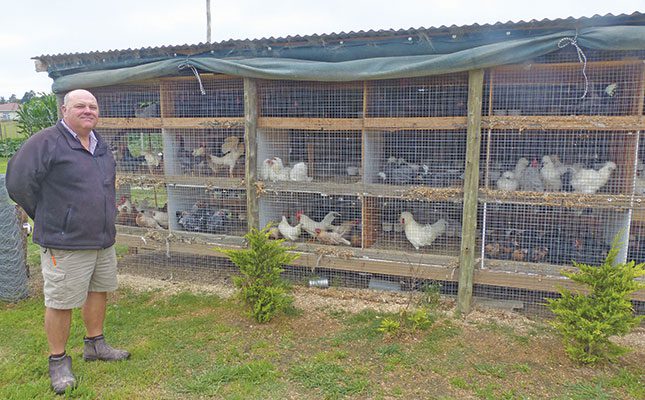
Photo: Mike Burgess
Clinton du Preez (49), a former chairman of the East London Poultry Society, has had one constant in his life: poultry. From early childhood to mid-life and through all life’s milestones, including completing school, securing his first job, establishing his own businesses, and getting married and having children, there has always been the clucking and crowing of chickens in the backyard.
His love for poultry was ignited when his grandfather, Stanley Sonnenberger, gave him three chickens at the tender age of seven. These three birds proved to be the vanguard for many more that would populate the backyard of Du Preez’s parents’ suburban home in Cambridge, East London.
READ How two brothers built a R100-million farming business in 10 years
However, the development of his refined interest in the more focused breeding and showing of poultry was fuelled by the friendship he developed with renowned East London poultry showman William Hunter. The two met in 1995, after Du Preez responded to his newspaper advertisement concerning the sale of three Australorps. “We met and became friends,” recalls Du Preez. “He helped me with everything [relating to the breeding and showing of poultry].”
By 1997, the 22-year-old Du Preez showed his first chickens at the East London Agricultural Show to the great satisfaction of Hunter. The elderly Hunter, however, passed away two years later, but had by then left a lasting impression on Du Preez, who has ever since been breeding and showing poultry with great success.
Breeding
Du Preez’s primary focus is breeding various soft and hard feather breeds (in large and bantam) and an assortment of true bantams. His favourites include Bearded Silkies (white), Leghorns (white), Old English Game bantams and a uniquely coloured Leghorn (pile) bantam that he will show for the first time this season.
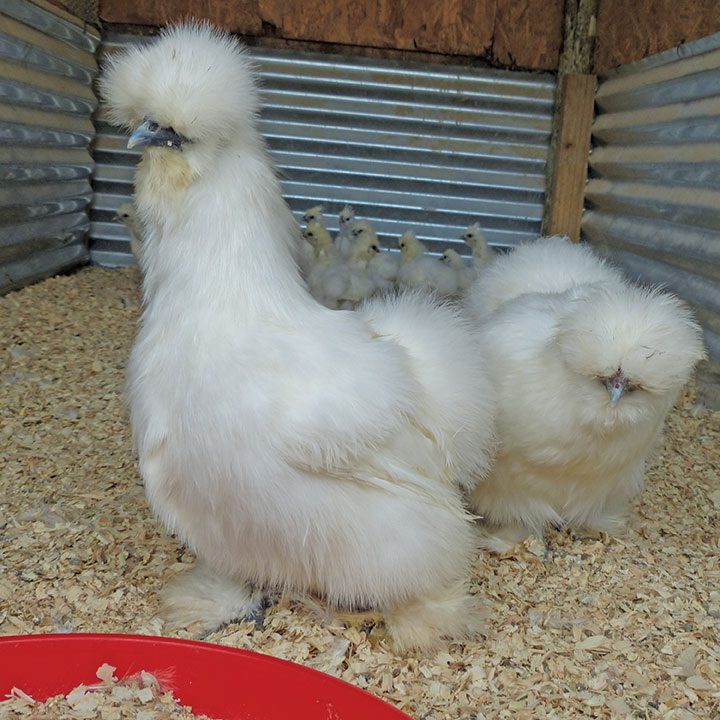
According to Du Preez, regardless of breed, the best-looking show chickens are almost never the ones that produce the best offspring.
“I am always annoyed when somebody asks for a bird to breed with that is of show quality. People think these birds will breed exceptional poultry, but they will probably breed nothing [of value] from them.”
Furthermore, Du Preez explains, that even when the best possible genetics for a specific breeding programme have been identified, only two out of every 10 chicks will be show birds, and this can also only be determined after they have been allowed to mature.
He says some breeders recklessly introduce new birds into their breeding programmes, a habit that can often have disastrous genetic consequences.
READ First-aid basics for small-scale poultry farmers
“The hybrid vigour can radically change things in the offspring, and you can easily be saddled with more than you bargained for. For example, your birds can dramatically increase or decrease in size, and type can be altered.”
On the other hand, if the focus is too much on a line-breeding approach, the pitfalls can also be numerous, he says.
“We do line breeding, but you can only go so far before you pick up weaknesses in the feet, legs or wings, and birds can even develop crooked toes,” explains Du Preez.
“There is no quick fix when it comes to breeding. It is always about balance, and you must be comfortable with what you introduce into your established line.”
Breed standards are formulated by the South African Show Poultry Organisation (SASPO), and breeding top show poultry is all about producing birds that physically express these standards.
The problem is that breed standards are by no means set in stone, and changes are made from time to time in terms of colour, weight and other attributes, making it necessary for breeders to be flexible. A recent example of this was the abolishing of the practice of dubbing in 2015, which involved the trimming of combs, wattles and lobes in traditional game fighting breeds.
“You never bred for the comb and a pretty head in game breeds. It was all about body, muscle, type, strength, strong legs, agility and a strong beak,” explains Du Preez. “Now, head points are also of importance, and for example, white lobes and fleshy combs that could simply be cut off will now have to be bred out.”
Showing, judging and auctions
In 2023, Du Preez showed poultry in the Eastern Cape, including East London and Komga (organised by the East London Poultry Society) and Bathurst (organised by the Eastern Cape Poultry Club) and further afield, including Bloemfontein (Free State), Vryburg (North West) and Villiersdorp (Western Cape).
The first step to selecting show birds is to cull those with obvious faults, including crooked, feathered toes and shanks, dented breastbones and white in the lobes. Once the individual show chickens are identified, they are meticulously washed, blow-dried and even have their combs oiled.
“You don’t want to know me during this time,” admits Du Preez, a consummate perfectionist. “I am very grumpy.”
In 2023, Du Preez also became the first SASPO-accredited poultry judge from the Eastern Cape in decades. To be considered as a judge, an applicant must have showed the breed they wish to judge for three years, and in all four classes: cock, cockerel, hen and pullet.
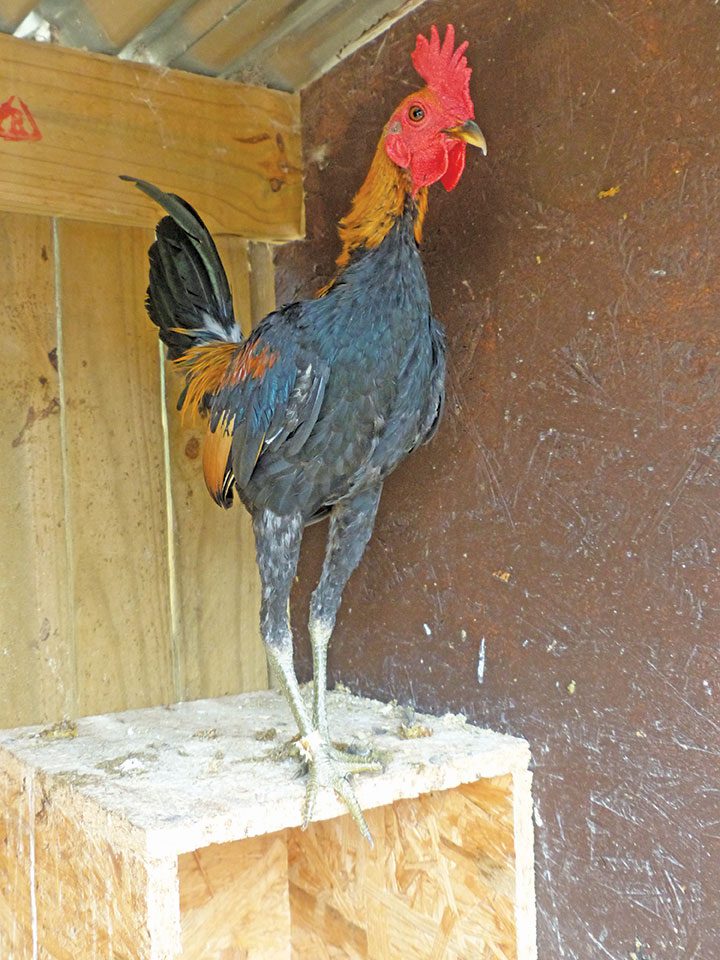
Aspiring judges are also subjected to demanding theory exams, seven judging apprenticeships at seven shows, and a practical examination by three qualified judges.
Currently, Du Preez can judge Old English Game and Leghorn varieties, and he hopes to qualify this year as a judge for Orpington, Australorp and Rhode Island Red.
Selling and buying poultry is a crucial component to any chicken breeder’s repertoire. Poultry is not only sold after shows, but auctions are crucial to source unique genetics.
Nowadays, poultry auctions are managed via WhatsApp groups like Saartjie Odendaal’s Poultry WhatsApp Auctions, a leader in this field. Specialised pet transporters make delivery of birds from anywhere in the country possible, and Du Preez for example uses CT Birds & Poultry based in Cape Town. In 2023, he sourced chickens from as far afield as the Western Cape, Free State and Limpopo.
Management
Having over the years relocated numerous times, Du Preez knows exactly what he wants from chicken enclosures. He says all chickens must be housed under a roof and they are never allowed out during wet weather. Walkways between enclosures are always concreted, and effective drainage measures ensure mud-free dry spaces in which to manage the chickens.
READ Two important poultry diseases you need to know about
His enclosures are built to receive morning sun, while the floors of all chicken coops are lined with fresh saw dust sourced from East London.
Chickens are fed a wide variety of feed, but Du Preez’s standard ration for adult chickens consists of freshly ground maize, Epol broiler post finisher (pellet) wheat, sorghum and sunflower.
Young poultry, from day-olds, are fed Epol broiler finisher (crumble) and never the Epol starter in order to manage protein intake. Other feed includes boiled eggs (chopped up finely), rice, spinach, cabbage, lucerne and sour milk.
Poultry health is also crucial, and birds are vaccinated for Newcastle disease, infectious bursal disease (Gumboro), infectious bronchitis, fowl pox, infectious laryngotracheitis and infectious coryza. Selected vitamins and minerals are also administered through drinking water.
The management of chickens is expensive and Du Preez admits that his show poultry venture is funded by his textile retail outlets in Stutterheim and East London. “There is no real money in show poultry,” he admits. “But it has never been about money; I do it for the love of it.”
Phone Clinton du Preez on 083 486 6733.

